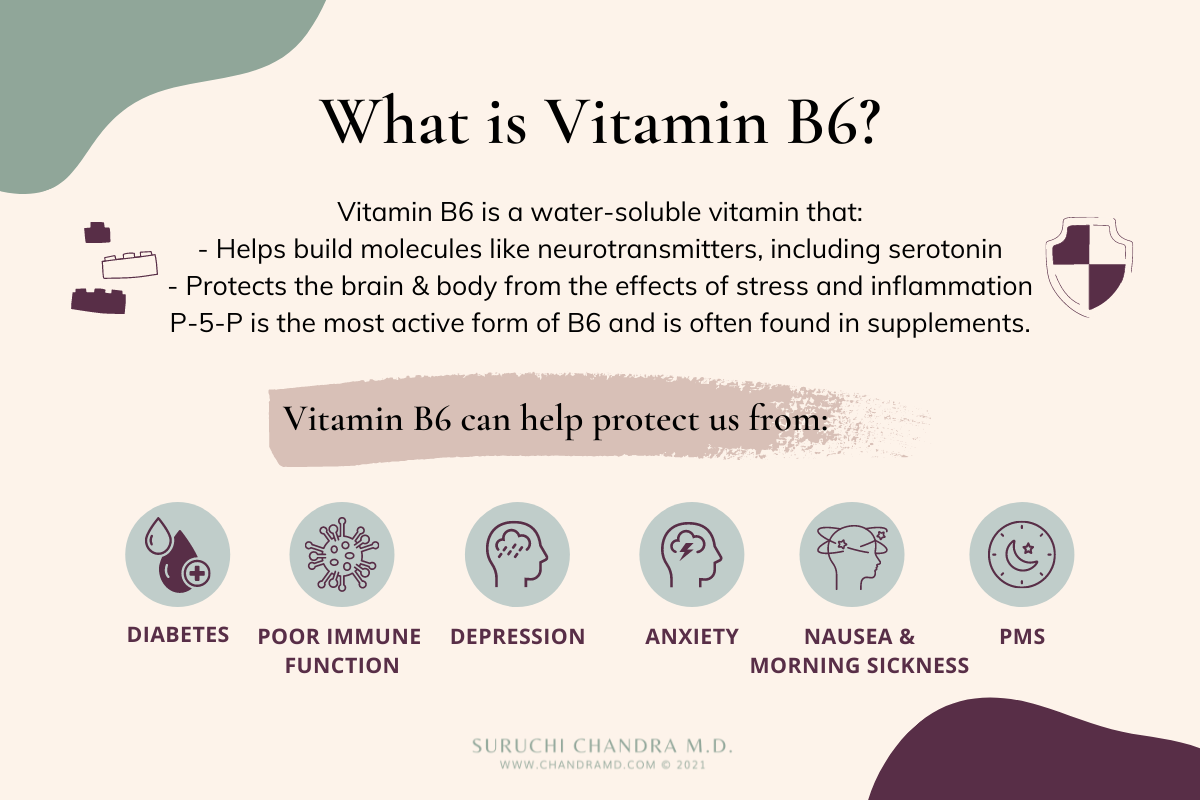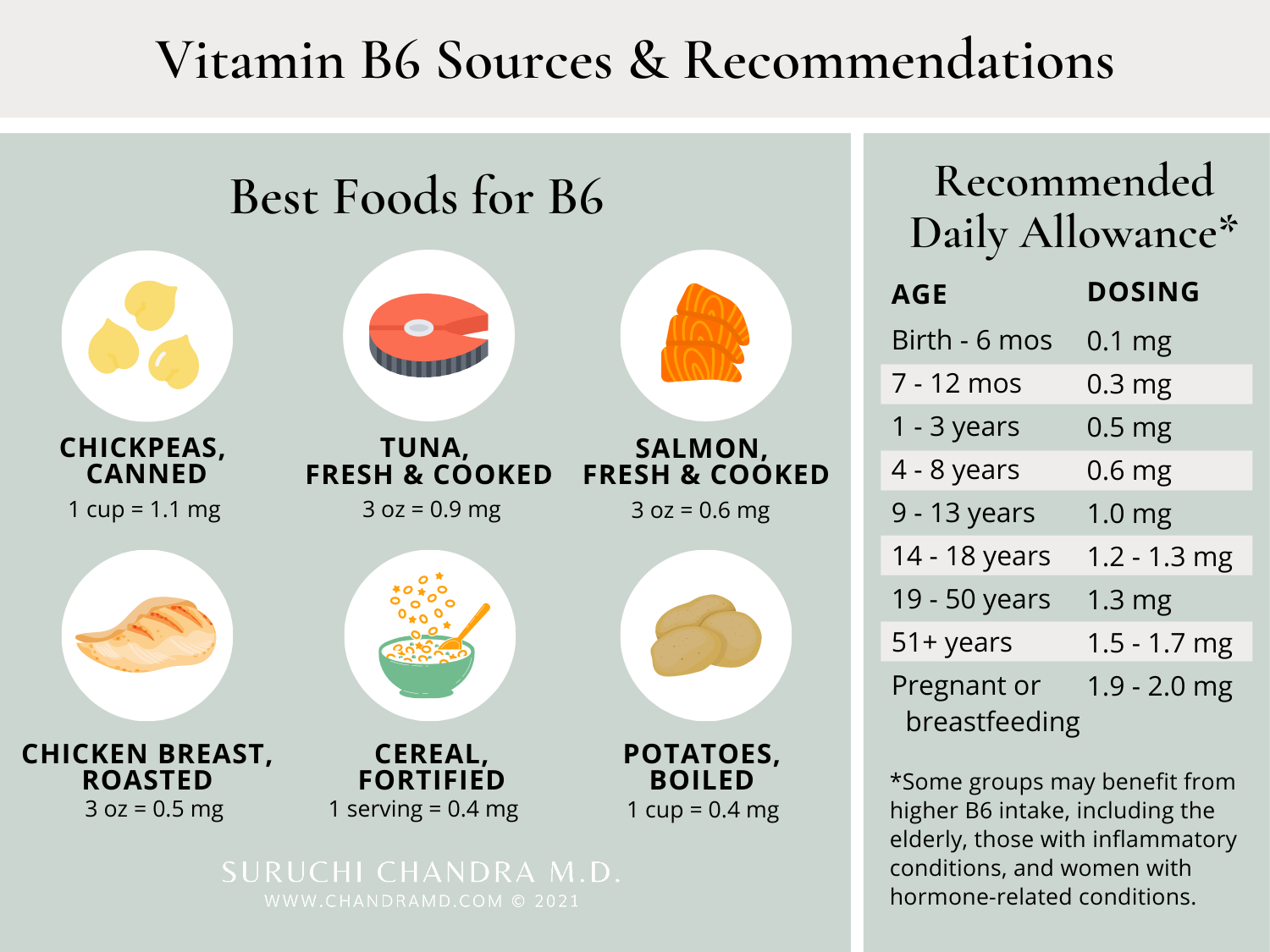While true vitamin B6 deficiency is rare, there are many people who may benefit from increasing their B6 levels, including those with inflammatory conditions. In this article, we shine a spotlight on B6 and answer questions including:
What is vitamin B6? What does it do?

Vitamin B6 is a water-soluble vitamin that we must get through our food, as our bodies can’t make on their own. There are six different forms of B6, and pyridoxal 5’-phosphate (a.k.a PLP or P-5-P) is the most active form that the body can easily use for important functions.
B6 is like a busy, productive factory worker that operates in over 150 pathways in the body. Its two main roles include:
-
Building and breaking down molecules, including amino acids, fats, and neurotransmitters. Notably, it helps to break down the amino acid homocysteine. Too much homocysteine can be a risk factor for heart disease, stroke, and dementia.
-
Protecting us from the effects of stress. Over time, stressors like high blood sugar and inflammation can cause damage to our cells and tissues, leading to more serious conditions like diabetes.
In addition to its many tasks in the body, B6 is also busy at work in the brain.
B6 VS. STRESS: HOW B6 PROTECTS THE BRAIN
Most of us know how stress can affect our mood and energy levels during the day. However, handling stress isn’t just about being mentally strong enough. Chronic or long-term stress can actually change the brain’s biology and make us more vulnerable to conditions like depression and anxiety.
Vitamin B6 is arguably the most important B vitamin for mental and brain health because it is critical for making neurotransmitters and can help minimize the harmful effects of stress, including:
-
Psychological effects of stress: B6 helps produce calming neurotransmitters, including serotonin and GABA. These neurotransmitters can help us feel more stable and less overwhelmed in the face of trauma or day-to-day stressors.
-
Biological effects of stress: Over time, stress hormones like cortisol can cause damage to the brain and body, resulting in problems including memory loss and stomach ulcers.
-
Physical toxins and infections: Animal studies have found that B6 may reduce brain inflammation and cell death and prevent memory loss associated with meningitis infection.
In order to effectively handle stress emotionally and physically, it’s important to have optimal levels of B6.
Is vitamin B6 deficiency common?
True vitamin B6 deficiency is fortunately rare. It mainly occurs in the setting of serious medical conditions. Symptoms of vitamin B6 deficiency include seizures, anemia, and seborrheic dermatitis.
However, low or suboptimal levels of vitamin B6 are more common and can leave us more vulnerable to the harmful effects of stress. There are certain groups of people who are especially at risk for suboptimal levels, including:
-
Women of childbearing age (with hormone-related issues): A national survey found that women of childbearing age were more likely to have low levels of B6 compared to their male counterparts. For most women, this does not appear to have any adverse health effects. However, women with PMS or morning sickness may benefit from increasing their levels of vitamin B6.
-
Elderly: The national survey also showed that B6 levels decline with age. The elderly may need higher levels of B6 to handle medical complications and inflammation that occur with age.
-
Those with inflammatory illnesses (diabetes, cardiovascular disease, arthritis, chronic inflammatory bowel diseases, etc.): One study found that inflammation can deplete B6 levels in body tissue, making it less available for other important protective functions.
People in these groups and those with other medical conditions listed below may benefit from higher levels of vitamin B6.
What are vitamin B6 benefits? What conditions is B6 helpful for?
Having a healthy amount of B6 can protect us from many psychological and medical conditions, including:
-
Diabetes: B6 appears to be protective against developing diabetes, as well as the medical complications associated with the condition. High levels of blood sugar can cause damage to tissue in the heart, blood vessels, and eyes. One study found that vitamin B6, along with folate supplementation, was able to reverse the damage to blood vessels in children with diabetes.
-
Depression: In one review, B6 was found to be a helpful treatment for premenopausal women with depression. The authors recommended further research into B6 as a therapy for hormone-related depression in women.
-
Anxiety & Stress: Research suggests that higher levels of B6 can help shift the body from fight-or-flight mode to a more relaxed state. In a recent study, those with extreme stress reported greater improvement when taking B6 with magnesium compared to magnesium alone.
-
PMS: A review found that B6 supplements are likely helpful for the emotional symptoms of premenstrual syndrome. In one study, women who received B6 treatment reported significant improvements in mood, irritability, and tiredness. However, larger-scale studies still need to be completed before definitive recommendations can be made.
-
Nausea & morning sickness: The American College of Obstetricians and Gynecologists recommends vitamin B6 as a first-line treatment for nausea and vomiting during pregnancy. Pregnant women should always consult with their doctors before starting any new supplements or medications.
-
Poor immune function: When B6 levels are low, the body is not able to effectively fight off infections. In one study, B6 supplementation of 50mg was found to improve immune response in critically ill patients. However, well-designed and larger studies need to be done before recommendations can be made for the use of B6 for infections.
What foods have vitamin B6?

Given the importance of B6 in managing stress, it’s fortunately abundant in many foods. Most people can get sufficient amounts from their diet if they eat poultry, fish, starchy vegetables like potatoes, and fruits.
Vegetarians were originally thought to be at risk for low levels of B6, as plant-based foods typically contain a less bioavailable form of B6. However, a 2021 study found that vegetarians had similar levels of B6 as those who consumed animal products.
How much vitamin B6 do I need?
According to the NIH, the recommended daily intake for children is between 0.5 – 1.3mg per day. Depending on age or gender, adults need between 1.3 – 1.9mg. Pregnant and breastfeeding women need the highest amounts of B6 around 2mg.
However, some people may need more B6 for optimal functioning. Even among those who consume an adequate amount of B6 in their diet, certain groups have been found to have low levels of B6 in their blood, including oral contraceptive users and the elderly. This is because of biochemical individuality – the amount of a vitamin or mineral that an individual needs can vary greatly based on unique factors such as gender, age, genetics, and underlying medical conditions.
CAN I TEST MY LEVELS OF B6?
If you are concerned that you may have low levels, blood tests are readily available. Serum or blood levels of P-5-P are the best indicator of long-term body stores of vitamin B6.
While the optimal healthy range for B6 has not been definitely determined, those who are at the lower end of the normal range may benefit from increasing B6 intake through diet or supplementation. Typically, those taking supplements have higher levels than the usual reference ranges. However, this does not necessarily indicate toxicity.
What are the best vitamin B6 supplements?
B6 is available in many multivitamins, B-vitamin complexes, and individual supplements. Most of these supplements contain the bioavailable form as P-5-P because it is assumed to be a more effective form. However, there are no studies supporting that P-5-P is better than other forms of vitamin B6. B6 and P-5-P supplements are typically available in ranges from 30 – 250mg.
Our Favorite Vitamin B6 Supplements
We trust the following products based on their quality and our clinical experience: Klaire Labs & Designs for Health.
We are not endorsed by, directly affiliated with, maintained, authorized, or sponsored by any of these brands. All product and company names are the registered trademarks of their original owners.
Are vitamin B6 supplements safe?
Vitamin B6 is considered safe at doses of 100mg or less a day for adults, which includes the amount from food and supplements. For children, the NIH reports upper limits between 30 – 80mg based on age. Supplementing with doses above the upper limit should only be done under the supervision of a doctor.
B6 or P-5-P is one of the few water-soluble supplements that can result in toxicity when taken at too high a dose. However, most cases of toxicity that have been documented occurred in the setting of long-term use with very high doses, typically 1000mg a day or more. It is not possible to get toxic levels from food sources alone. The most common side-effects of toxic levels of B6 are sensory neuropathy and impaired balance or coordination.
Vitamin B6 (Pyridoxine): A Helpful Tool for Stress Management
B6 is an overlooked strategy for handling stress and inflammatory conditions. Many people may benefit from this well-tolerated and inexpensive treatment at lower doses. While most studies look at B6 alone as a treatment, it seems to work best in an integrated approach with other B vitamins, minerals like magnesium, and other nutrients. For those who are at risk or prone to low levels, you may want to discuss with your doctor if B6 supplementation could be helpful.
References







